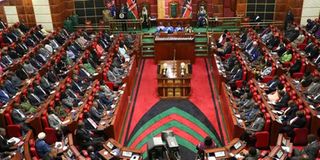MP proposes agency to monitor implementation of Parliament decisions

A joint National Assembly and Senate sitting on March 27, 2014. PHOTO | FILE | NATION MEDIA GROUP
What you need to know:
The bill borrows heavily from the legislative practices in India that has a whole ministry charged with the monitoring and evaluation of legislative decisions, and Uganda.
- The Committee on Implementation in the National Assembly is the only one charged with oversight of implementation of all the House resolutions but lacks the legal teeth beyond the standing orders.
- Despite the continued efforts by Parliament and county assemblies to follow up on the implementation status of reports, there has been unsatisfactory responses by the implementing agencies.
The national government and county ministers will now be compelled to implement decisions of Parliament and county assemblies within set timelines if a proposed bill becomes law.
The Implementation of Government Assurances Bill 2018, seeks to establish a monitoring and evaluation body through which decisions, assurances, pledges or undertakings and resolutions passed by Parliament and county assemblies are implemented effectively.
The proposed body will be domiciled in Parliament with its own staff, according to the sponsor of the bill, nominated MP Godfrey Osotsi.
“The passage of the bill will enhance parliamentary oversight at the national and county levels thereby sealing the existing loopholes in the doctrine of separation of powers and supremacy of Parliament,” said Mr Osotsi, noting that some decisions remain overlooked since independence.
HOUSE RESOLUTIONS
The bill borrows heavily from the legislative practices in India that has a whole ministry charged with the monitoring and evaluation of legislative decisions, and Uganda.
Currently, the Committee on Implementation in the National Assembly is the only one charged with oversight of implementation of all the House resolutions among them, petitions and reports but lacks the legal teeth beyond the standing orders.
The Senate and the County Assemblies have no such monitoring mechanisms of their own, meaning that the decisions they pass could be in vain even though the Constitution does not envisage such a case.
“There is need to set up an effective mechanism for the implementation of House resolutions and follow up pledges made by the executive with a view to uphold the principal of government accountability,” Mr Osotsi said.
Currently, it takes 90 days for the committee to start tracking the implementation reports, motions and resolutions passed by Parliament.
SHELVED REPORTS
The Ndung’u Land Commission report passed over 20 years ago, crisis facing the sugar industry in the country and the annual auditor-general’s reports are among the many that remain unimplemented.
Consequently, reports on Commission on Post-Election Violence (CIPEV) and the Independent Review on Electoral Commission (IREC) that sought to address the 2008 post-poll fight are yet to be implemented fully because of lethargy by responsible government agencies and the absence of an effective body to follow up.
The proposed law is premised on the basis that the National Assembly, Senate and county assemblies derive their oversight mandate from the Constitution to ensure checks and balances on the other arms of the government.
Despite the continued efforts by Parliament and county assemblies to follow up on the implementation status of reports, there has been unabated inaction and unsatisfactory responses by the implementing agencies.
“This noncompliance has led to contempt of legislative decisions rendering the work of Parliament futile. This is the mischief that the bill seeks to address,” the MP said.




